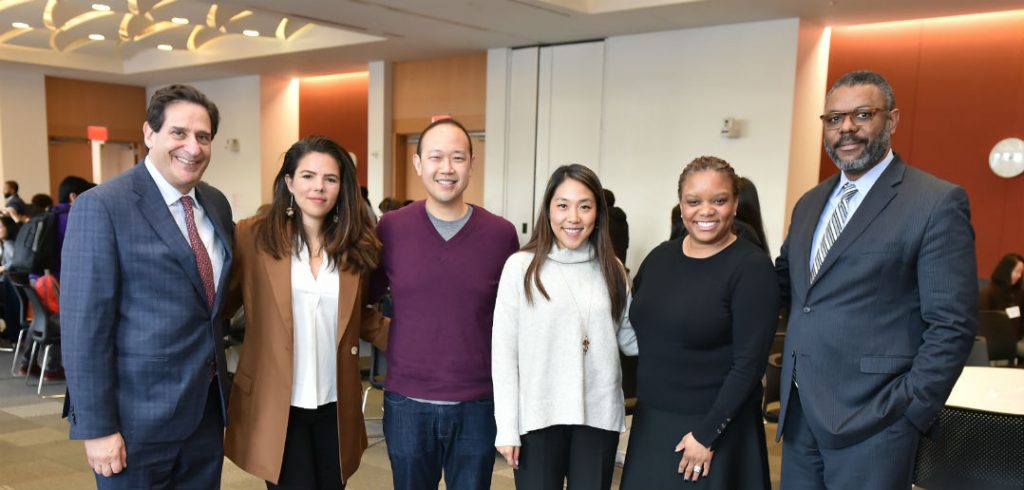On February 24, Fordham Law’s Law Student Association Diversity luncheon brought together four Fordham Law alumni—Chieh Huang ’08, Vanessa A. Nadal ’10, Khadijah Sharif-Drinkard ’97, and Helen Shin ’08—to speak about their experiences as law students and professionals from diverse backgrounds and to offer advice to the assembled students.
 The event—the first of its kind at the Law School—was aimed at connecting members of student affinity groups with prominent alumni and strengthening the Fordham Law network. Students from the Black Law Students Association (BLSA), Latin American Law Students Association (LALSA), Asian Pacific American Law Students Association (APALSA), and South Asian Law Students Association (SALSA) attended, as well as alumni, faculty, and staff.
The event—the first of its kind at the Law School—was aimed at connecting members of student affinity groups with prominent alumni and strengthening the Fordham Law network. Students from the Black Law Students Association (BLSA), Latin American Law Students Association (LALSA), Asian Pacific American Law Students Association (APALSA), and South Asian Law Students Association (SALSA) attended, as well as alumni, faculty, and staff.
Dean Matthew Diller moderated the conversation, which he opened by asking the speakers to discuss the challenges they faced entering law school as members of historically underrepresented groups.
Sharif-Drinkard, senior vice president of Business and Legal Affairs at ViacomCBS, noted that the rigors of the first year of law school posed the biggest challenge. “Understanding the new language of law was what I had trouble with—I think all of us did,” she remembered.
When Shin, who is now vice president in the legal department at Warner Music Group, was in law school, she was the first in her family to advance to a career in a professional field in the United States. “I knew I wanted to be a lawyer, but I had no idea what that really meant,” she recalled. “And I didn’t have anyone in my personal life to guide me through that decision-making process, so I had to turn to outside networks, like the affinity groups.”
Diller turned the subject to growing one’s professional network through mentors and sponsors.
 “Take people at their word when they offer you help,” advised Nadal, an adjunct professor and co-creator of Fordham Law’s first Cosmetics Regulation course.
“Take people at their word when they offer you help,” advised Nadal, an adjunct professor and co-creator of Fordham Law’s first Cosmetics Regulation course.
Huang, co-founder and CEO of Boxed.com, spoke to the importance of representation and about encountering a more subtle form of racism than his parents or grandparents may have experienced. “Sixty or seventy years ago, people would say, ‘You don’t belong’ because of your race, ethnicity, or whatever,” he said. “Now, it’s less overt. We have other signals we use to communicate to one another—like when you show up [to an interview]and you’re the only person who looks like you, you start to read between the lines and think, ‘I don’t belong here.’” Huang said that APALSA events and seeing prominent Asian American alumni—like Hon. Denny Chin ’78—around the law school made him feel supported and represented.
Acknowledging the importance of representation and community, Sharif-Drinkard also cautioned against falling into the mindset of solely seeking support from within one’s own race, religion, or gender identity. “It’s important to see yourself in others, but there might be a rainbow of people interested in being your sponsor. In my career, I’ve had people from all different walks of life who helped me grow and develop.”

Student Candela Llopis ’21 asked how to navigate the US legal field if English was not their first language. While all the speakers agreed that a firm grasp of English was necessary for legal writing and practice, Nadal recounted her own post-law school experience, when her fluency in Spanish afforded her opportunities that she might not have had otherwise so early in her career. She suggested students reframe their differences as advantages, reminding them, “What sets you apart is your strength.”

